#hadestown nytw stagings
Text
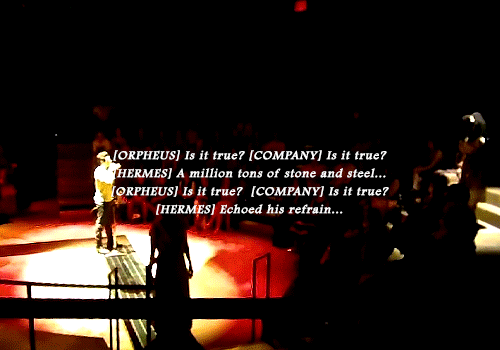


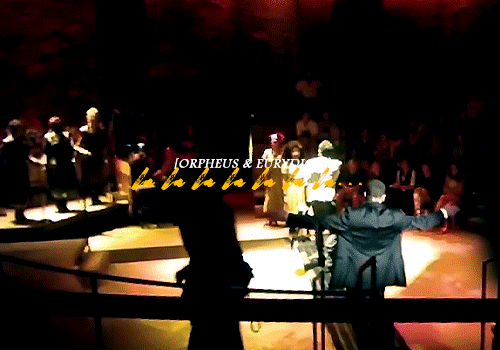

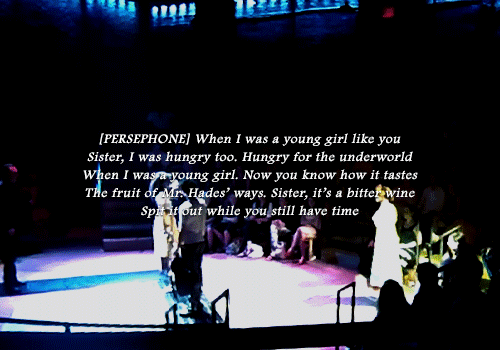
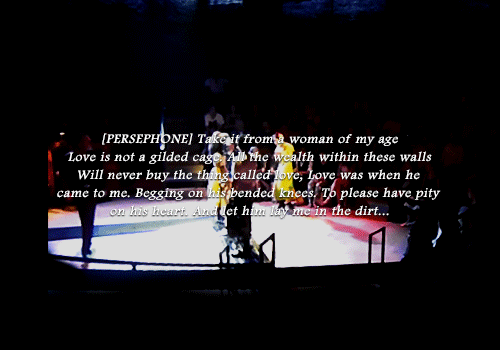



Young man, I was young once too. I once sang the young man’s blues Women come and women go. Get you high and get you low. One day she’s hot, the next she’s cold. Women are so seasonal. Women leave again and again. Take it from an old man
nytw hadestown appreciation → Chant II
#hadestown#hadestown nytw#hadestownedit#musicaltheatreedit#theatreedit#broadwayedit#musicaledit#musicalgifs#userkayles#damon daunno#nabiyah be#amber gray#patrick page#orpheus x eurydice#nytw ht appreciation#mine*#i love the simple staging of this song... It makes me feel so crazy!
76 notes
·
View notes
Text
i heard livin it up on top (bway version of course) play on the radio tonight on my drive home. and while i am not going to turn this into yet another Opinion Piece about Which Version of the show is Best(tm) it did make me think about how often operas will be performed in different versions. the age old battle of prague vs vienna don giovanni (nevermind the fact that the current most common/popular production combined elements of both libretti) and italian vs french, four act vs five act don carlo(s), or magic flute productions which can look and act completely different from one another based on what recits are kept or cut or translated loosely or rewritten entirely. for several reasons of course i don't see musicals doing the same type of thing Any time soon but it would be interesting indeed if they did
#sasha speaks#imagine a world where both nytw and bway hadestown were both extant and valid production concepts that get performed#without one overtaking the other as Definitive or Final. imagine how many other shows would look different#if their earlier drafts were made public and allowed to be put to stage again and played with...#also my opinions on the aforementioned operas. if you must know:#do whatever you want forever with magic flute; i don't care about don carlo enough to want to Fix It in any way;#and don g is best with both dalla and tesoro while mi tradi and the finale sextet are indispensable. And per queste sucks thank you amen
11 notes
·
View notes
Text
every now and then i think about how the last two shows I did where I had supporting/leading roles the directors had us do full cast bows and i didn't get to do a partner/personal bow and i just be a little petty about it for a few minutes
#post about my life#i just watched the NYTW hadestown and even with a cast of; what; 10?#who all were on stage regularly and consistently to some degree throughout#still did a structured bow#I JUST WANTED TO HAVE MY OWN BOW AS MORITZ; IS WHAT I'M GETTING AT RN
0 notes
Note
Hi! So I am very new to Hadestown and I am watching the bootleg. I really love the dynamic between Hades and Persephone, but there is one thing that kind of rub me in not so good way, is Hey Little Song Bird implied that Hades and Eurydice slept together? I am seeing a lot of interpretation and it genuinely confused the hell out of me asdfghk
Hi! Well, tbf it's a tricky question, but the short answer is that Hadestown suggests that something might have happened behind closed doors. The rest is up to audience and actor's interpretation.
For example, Anaïs Mitchell often mentions in Working On a Song that in early workshops she often went with the idea that Hades cheats and pretty regularly even though these affairs mean nothing to him since the only person he loves is Persephone. It even had a cut song:
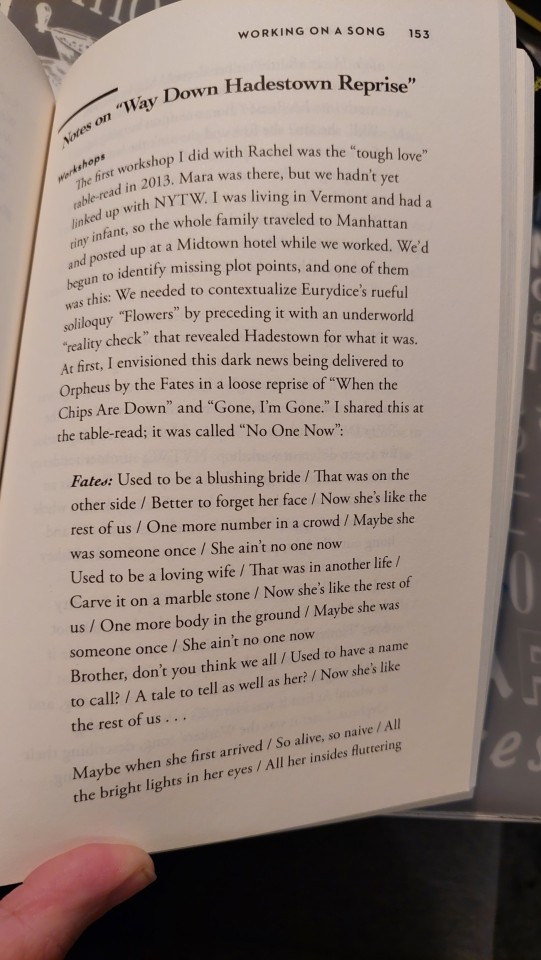
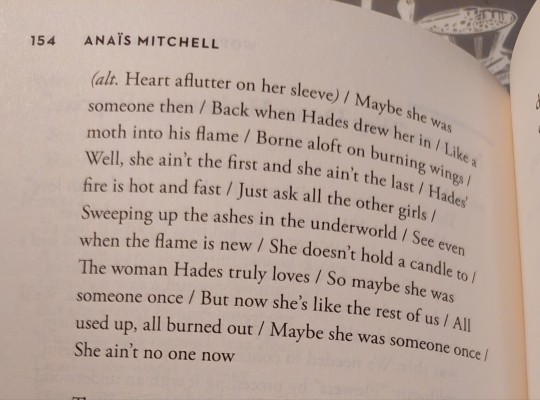
In her early drafts/productions of Hadestown you can often get the vibe that from her point of view it doesn't matter as much because they are eternal beings and love each other since the world began so does it even matter for them?
However, by NYTW this story line was cut apart from Persephone's line in How Long:
"I don't mind if you look at other girls, now and then"
"The girl means nothing to me"
"I know"
Plus the staging in NYTW Papers and Hades' protective peacock behavior with Eurydice around Orpheus in the scene also gives you a thought that they might have had an affair? Plus some bits like the fact that she has a line in Why We Build a Wall and her words "But don't you see? That's different with me!" - "Different than who? They thought they were different too!" Could also be interpreted as Hades suggesting some special conditions by granting her a role of a romantic interest. Whether the interest is real or not and did he use it or not is again up to your interpretation of NYTW Hades. He is more of a morally dubious guy (as all ht Hades are) so it's more up to you to either believe he would have cheated to put Persephone in her place or would just use showing off Eurydice as a brutal way to get Persephone's interest.
As for Broadway, I think it's still suggested and you can find profs in the lyrics but I think that they are what they are - suggestive and leave you to interprete it whichever way you feel comfortable. I think the biggest suggestion remains in Flowers with the line:
'I trembled when he laid me out
"You won’t feel a thing," he said, "when you go down"'
Which kinda can have a death meaning and sex meaning, tbf someone could have written a good article on how those topics are connected in Hadestown. So here, again chose one of the two or both.
But again, Broadway also changed the lyrics in How Long and the whole staging in Papers so it's less suggestive.
My personal opinion based on Broadway production is that it all depends on how the actor plays it and whether you believe this particular Hades is the type to sleep with Eurydice to get Persephone's attention and prove he is still attractive or he is more of a person who doesn't care about having the affair and his only goal is to get Persephone to react somehow by composing such a messed up hurtful plan. Personally, I prefer the second option maybe because I'm a pussy or maybe because I see Hades (whom I mostly base on Patrick Page ht Broadway previews) like a person who is desperate to get Persephone's attention in such a radical way like a cat pushing objects from your table to see your reaction. He wants to be stopped, he wants any reaction from Persephone. He even touches her by the shoulder before going into the office like "Look!! Look! I'm absolutely totally leaving! To cheat! See! Hey come on! I'll even take off my tie to show that I'm serious! Don't you wanna stop me???". Seems kinda way too extra to me. Like he could have just gotten to the office after parading a pretty girl in front of her and it would be understood that it's for an affair. But he takes so much time to make sure she understands that he can find himself someone when all he wants is for her to come back to him with open arms. I'm not sure he has the guts to actually damage his relationship to an irreversible degree (considering Broadway Hades is never stated as a cheater before the Eurydice sub-plot). Like it's one thing to take a mortal before her time and parade her in front of your wife (because what is a mortal life after all?) as a "replacement" and it's the other way to actually cheat on her and deal with the fact that she might never forgive him again if it is a deal-breaker for her considering they seem to be true to each other for all these years.
One interesting thing to note here as well is how Hades actors play the reaction to Persephone's line in How Long:
"He has the kind if love that you and I once had"
Because his instant reaction is "OH SHIT once had?? Does she think I don't love her still?? OH SHIT I BROUGHT THE GIRL THIS IS WHY SHE MIGHT THINK THAT", so he answers to that:
"The girl means nothing to me!"
Depending on the actor and she show the line sounds either scared, confused, angry, undignified etc. So it's once again up to you to interprete why he reacts this way: is he angry because she suggested he would actually cheated on her? Is he angry because she called him out on that affair? Is he confused and scared because she thinks he doesn't love her anymore because of his foolish decision to tease her in such a cruel way?
That's up to you.
P.S. I think one of the most interesting studies of the subject and Hades' character that I've read in a fic for that matter was the Songbird chapter of Winters Nigh and Summers O're. You can check it out, but I will warn you that it's probably one of the heaviest chapters of that fic in the emotional sense and it has explicit parts (don't worry, nothing bad happens to Eurydice. Well...apart from dying, I guess), so check out the warnings if you decide to read it.
#me being me#hadestown#hades#eurydice#persephone#hadestown analysis#i guess#i honestly wanted to reply shortly but then got interested in thinking about the subject and wrote a huge ass post#sorry anon hope you'll enjoy it tho#i do think Songbird chapter is like the most painful ht fic I've read ngl#traumatic but so so good
113 notes
·
View notes
Note
This world cup is going to force me to watch/listen to Hadestown because it keeps beating like REALLY good musicals that I love and I guess I have to see what the hype is? Idk, what’s so good about it that it can beat The Music Man, The Lion King, AND The Sound of Music!?!?
You absolutely should! In my opinion, Hadestown is one of the greatest musicals out there. It has an interesting and emotional story, a spectacular score with some jazz and folk influence, in addition to being an amazing live experience (it is one of only two musicals I have been able to see live) with a brilliant set and talented cast members in every production. It essentially has all the parts of a great musical, and all the parts fit together to make something spectacular! I could write much more about Hadestown, but I haven't the time for that.
If you do listen to Hadestown, there are three different albums to choose from, and I would recommend listening to these from top to bottom on this list (if you like Hadestown enough to listen to all of them)
The 2019 Original Broadway Cast Recording from the definitive iteration of the show on Broadway is the only album to contain every song in the show. As the show is sung-through, this one is two hours long. (This one is my favorite!)
The Live Original Cast Recording from the 2016 Off-Broadway Production at NYTW, which has a fair amount of differences form the Broadway version, was recorded live on stage, which is a great plus, but it omits a fair number of the songs. (This one is also quite good)
The 2010 studio album features very early iterations of some of the songs. (This is the least musical theatre sounding version, but it provides an interesting snapshot into the musical's development)
#hadestown#best musical world cup#best musical world cup propaganda#best musical world cup official propaganda
95 notes
·
View notes
Text
Watching the recording of NYTW Hadestown, two minutes in, and already, I’m like, damn, that staging!
Glad they didn’t keep in the g-slur and it does feel like a strange song to open with but it’s sooo beautiful!
#hadestown#hadestown nytw#dm me if you want to know how to find the boot#there’s also an obc and an edmonton one#all higher quality
12 notes
·
View notes
Text
Okay I'm not over the NYTW Lover's Desire dance actually I have no idea if it's the same in the Broadway version and I don't particularly intend to find out bc I gave my heart to NYTW and I'm a production monogamist BUT. The fucking lovers desire dance. I have been in love with Hadestown for five years and it took me maybe two of those years to find a recording of just the intro to the NYTW Lover's Desire, okay, I was there when the preeminent YouTube playlist combined NYTW with the 2010 concept album, and by fucking god do you know what the lines "Hades and Persephone, they took each other's hands/ and brother, you know what they did? They danced" did to me the first time I heard them? It bruised my fucking heart is what it did. I'm not a crier and I STILL get misty-eyed every time. I listened to Lover's Desire for years and tried to imagine what their dance might look like, because I thought there simply was no NYTW recording and I would just never find out, and to see the way the actual dance was staged? The way they move like they can barely stand to let go of each other's hands for a moment? It's not flashy, or showy, or anything remotely difficult, it's just holding hands and moving together for the contentment of it, and twirling into each other's arms and staying there, and it's so 😭😭😭😭😭
#hadestown#nytw hadestown#NOT to mention ''it wasnt so much that the kingdom fell/ he just got swept off his feet''. GOD#aiden.txt
53 notes
·
View notes
Note
I completely agree with your thoughts on hadestown but i just think it’s interesting to look at it in comparison to a show like great comet that a lot of the same people love for a lot of the same reasons as hadestown (any version but nytw particularly) and wonder if great comet had made more sacrifices and made more changes to appeal to a wider audience when transferring from its off broadway run, would it have lasted longer? personally i do think so and idk i just think it begs the question of is it better to have a production that’s true to the show’s original purpose and has that charm that makes it an objectively stronger piece of theater even if it won’t last as long versus a more sanitized production that is more widely accessible and therefore has a greater longevity?
brilliant take here anon. so much of this conversation is going to be tinged by subjectivity (I personally think the few changes that Comet made in its transfer were generally quite excellent and only worked to streamline the story... and there is also of course the behemoth that is Dust and Ashes) but Great Comet did, in fact, refuse to make concessions in its transfer. a lot of my issues with the concept of the NYTW transfer for Hadestown come from me finding most of the choices so utterly inexplicable on an artistic level that I can hardly fathom being Mitchell and killing my darlings like that.
but to the actual point, I think Great Comet also had an uphill battle in its subject matter, and its marketing team (and Malloy himself, in songs like Prologue) had absolutely no choice but to lean into the inherent insanity of making a musical out of War and Peace. which necessitates a trust in the audience, and one which I think certain audiences really relished in (having trust like that built in is bound to pet ones ego; I know it petted mine as a 16-year-old!). but at the end of the day, it was always a tough sell to tourists (to whom our industry is so reliant on!!!), and this is totally regardless of its insane per-week costs for its technical elements. as an adult, I can realize that it never had much of a chance at a long Broadway run, especially with its behind-the-scenes issues which I will not discuss since they've been beaten to death. and I do wonder if there was less trust, would it have lasted longer? but to me Malloy is not an artist who necessarily dreams of Broadway; I think he works on passion projects and never expected Great Comet to make it to a Broadway house. good for him! so he didn't concede, but then again, how could he have, with the subject material and the concept of the musical to begin with?
(then again, Malloy was so terribly spit up on by the industry for Great Comet in a way that makes me feel livid. what personal vendetta robs him of a Tony for orchestrations?)
yesterday I (drunkenly) posted that I think no shows should aim for Broadway, which of course was a simplification of a situation. to me the best fate of a show in the long-run is probably starting Off-Broadway, transferring to Broadway for a season or two, then transferring back Off-Broadway when it's harder to fill those massive Broadway houses (but you're still getting audiences in seats) - a very different show, but this is what happened to The Play That Goes Wrong, which to me works so much better in an intimate stage anyway. then again, this still allows for the initial edit onto Broadway to occur, but I think Mitchell always dreamed about Hadestown having an expansive open run in the Walter Kerr and that it has done. so like. kind of shrugging here. the changes made in the transfer are (insanely) so... careful, done so much with an artistic hand that to me it's clear that Mitchell did it, but WHY for some of them. it's going to keep me up at night.
like of course, shows can't run forever, but it's a bit of a 'die a hero or live long enough to see yourself become the villain' or whatever. and it is so miserable that the Broadway machine necessitates a watering down of material or else you are fated to a short run; A Strange Loop of course enters the conversation at this junction, and of course upsets me. I have nothing else to say in particular and I think you are absolutely right, and I am upset.
#talking myself into circles etc. etc.#anonymous#ask#I do think I would've enjoyed GC more in an Off-Bway house more#due to intimacy. don't have strong thoughts on actual lyric changes tho
18 notes
·
View notes
Note
I don't know if you're still doing this but could you talk about the staging of "Why We Build The Wall" and the after stuff leading to the end of Act One in the NYTW production of "Hadestown"? I didn't see it on the masterlist. Thank you!
Hello!!! I’m sorry it took me so long to answer this!!!!
Just a quick reminder, there was no ensemble in NYTW ‘16! So the role of the chorus for this number was fulfilled by the Fates and Persephone (all in long hooded leather jackets that hid their faces) and in some party by the band itself, because the bandstand was positioned at the back of the stage behind Hades, so visually it almost looked like they were taking musical cues from him.
Honestly, it was pretty straightforward for most of the song. Patrick hardly even moved sometimes–yeah, he has THAT much gravitas to just, stand still singing a song at us, and I never felt bored?!?!–but he also had the big ol-fashioned mic that he took out of the stand when he really wanted to purr into it.
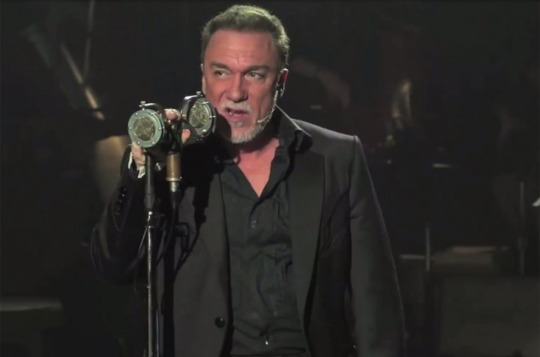
The lighting of the scene was intense reds and yellows (for the love of god I can’t find a pic, of ALL the scenes from NYTW that has a pic how did this one get skipped?!!?) but on the last verse (”What do we have that they should want?”) the light narrows into a spotlight on Hades on the stage floor, and then another pointed above, at the door entryway by the stairs, where Eurydice has just stepped out, looking around cautiously. Hades then sings this verse DIRECTLY at her, in an implicit “now your turn” cue.
And what does Eurydice do? She squares her shoulders and answers fiercely back to the audience too (”What do we have that they should want? We have a wall to work upon!”) and Hades smiles proudly and takes up the last verse with her and the Fates as Persephone, taking off her jacket hood, looks at the two of them in horror/rage.
Masterlist
38 notes
·
View notes
Text
it’s not fair to compare bway and nytw productions of hadestown because they are two completely different versions of the story.
#and that's that#also hiding this in the tags: damon's orpheus would not be suited to bway#the way he presented orpheus himself fit in a lot more with the vibes of the nytw production#and he absolutely nailed it#reeve's orpheus set the stage for bway because that's the way the character fit in with that interpretation#it's not fair to cast aside all the work he put into establishing his orpheus just because you prefer damon#and vice versa!#ok that's my two cents bye#made this post bc it really annoys me when people compare damon and reeve#like they are both amazing actors and singers in their own right!! come on!#hadestown#squid talks#orpheus#reeve carney#damon daunno
119 notes
·
View notes
Text
broadway epic i/broadway epic ii/nytw epic iii is the holy trinity
#hadestown#im listening to my 40 minute epic playlist and this is the objective truth#if anyone wants to drop the citadel epics that would be much appreciated!!!#mine#but the nytw epics i and ii are very... static. much like the concept album#no real storytelling or narrative drive#beautiful language though#and the london epics are all at a weird in between stage#also listening to london epic iii-- i really want to hear reeve carney do the nytw version of it#also 'arrow of eros' anais that is so clever (too clever which is probably what doomed it)#addendum that i LOVE concept album epic i (which is epic ii) but broadway epic ii as an aetiological origin story...#it just gets me
11 notes
·
View notes
Text
looking at the past years of musical theatre, it seems like we’re in an era where show creators are experimenting with new ways to make it more accessible to the public and i am ALL FOR IT
#speaking.#text post.#like newsies and bandstand released pro-shot recordings into cinemas#and hamilton is following suit#a show that lin clearly wanted to be seen as it was/is on stage#with the ham4ham raffles and videos#waitress had a constant rotation of theater and mainstream stars#and sara put out a record of her singing the songs and streamed a concert with a guest appearance by drew gehling on yahoo#six encourages you to fuckin RECORD the encore performance#iirc spongebob did a tv special on nickelodeon??#hadestown recorded the live audio for the run at nytw#there's a streaming service trying to push for limited releases of current broadway shows#it's really exciting
5 notes
·
View notes
Text
One of the most complex Hadestown characters is Persephone, starting from her dual roles as Hades’ wife and Queen of the Underworld, and goddess of spring who brings life to the people up top. In the Vermont and album days her role was mainly the former, as she didn’t stay up top for very long (and in Vermont, Hades even kept her trapped down below). Anais saw her as Orpheus’s protector and advocate, and her speakeasy, where she delivered contraband to the workers, as an act of rebellion against her husband. Her relationship with Hades also seems to be worse off than in later iterations of the show, with How Long being the only time they talk and the only clear indication that they still love one another.
For NYTW, Persephone’s role was expanded with Living It Up On Top and Chant, and her relationship with Hades grew more pronounced, as well as with Hermes and other characters. In NYTW in particular, her Chant verses talked about how she remembered the good times, warned Eurydice against Hades in Chant II while recalling how they met and fell in love, and lamented what Hades had become. Later versions established that she, too, had forgotten the song of love, and Persephone changed to focus on the problems Hades was creating for the mortals while still implicitly reflecting on better times.
By Edmonton Persephone and Hades were on fairly amiable terms from the start as they lounged at a stage-right cafe table to play dominoes, and by London a crucial part of Persephone’s development occurred with her self-medication via drinking. She had a glass of wine since the album art, but the idea of drowning her sorrows, and guilt, became a key facet to her character, with Amber Gray seeing her as complicit in Hadestown’s problems. On Broadway, the idea came that Persephone was in denial to a degree up top as well, with lines like ‘who says times are hard’ downplaying her own complicity in the state of affairs up above and in Hadestown; despite complaining to Hades, she’s willing to close her eyes to the worst of it until Orpheus’s song makes her see otherwise. OLOTU changed meanings too as a result; instead of ‘just’ providing the workers with contraband, she’s assuaging her own guilt as well, or even working to keep them in line depending on how you choose to read it.
Overall, Persephone became a much more morally gray, complex character over time, and it’s all tied to her love for Hades, her dedication to her job, and guilt over what Hadestown has become.
#hadestown#persephone#hadestown vermont#hadestown album#hadestown nytw#hadestown edmonton#hadestown london#hadestown broadway#hades#orpheus#eurydice#hermes#the workers
73 notes
·
View notes
Text
A non-comprehensive list of lines from earlier versions of Hadestown that were cut from the Broadway version and which I mourn daily. Might add to this later. Might also someday make a list of lines that were added for Broadway that bopped enormously to create spiritual balance. Bold is actually meant as emphasis for once.
Ruminations on Hades and industrial capitalism:
“King of diamonds, king of spades / Hades was king of a kingdom of dirt / miners of mines, diggers of graves / they bowed down to Hades who gave them work / and they bowed down to Hades who made them sweat / who paid them their wages and set them about / digging and dredging and dragging the depths of the Earth to turn its insides out / singing la la la la la la la.”
—Epic 1, original concept album and Epic 2, NYTW live recording.
(note: Anaïs Mitchell said ¡¡Keep it in the ground!! Also, “dangerous this jack of hearts” in His Kiss The Riot makes far more sense if playing cards get brought up in the first act. I am constantly floored by the fact that they cut this line, I think it’s one of the most beautiful pieces of poetry I’ve ever heard and that it sets the stage of this story absolutely perfectly. The stakes and the setting and the title character are all right here. Also establishes "la lalalala lala" as a song sung by laborers before anything else, which has very sexy implications for the divine natural power of the proletariat.)
“Heavy and hard is the heart of the king / king of iron, king of steel. / The heart of the king loves everything / like the hammer loves the nail.”
—Epic 2, original concept album, and Epic III, NYTW live recording.
(note: I fell in love with this line at 13 and never got over it. This line actually permanently shares a file in my brain with a Zadie Smith quote from White Teeth, “Oh he loves her, just as the English loved India and Africa and Ireland.”)
“And Hades is king of the scythe and the sword / he covers the world in the color of rust / he scrapes the sky and scars the earth / and he comes down heavy and hard on us.”
—Epic 2, original concept album and Epic III, NYTW live recording.
(note: the condemnation of industrialization and urbanization..skyscrapers and mining as a physical wound inflicted on nature...also the consonance...)
“Oh he said he’d shelter us,/ he said he’d harbor me, / he said we’d build them up / and then the walls would set us free....Oh, he said he’d shelter us / He said he’d harbor me / He said we’d soldier on/ And then the war would bring us peace. I’m gonna count to three /and then I’ll raise my head, singing, /Is it true? Is it true what he said?”
—Chant II, NYTW live recording.
(note: I actually quite like the worker’s chorus lines that replaced this on Broadway, but I miss the lyrical callbacks to Hey Little Songbird and Why We Build The Wall. Also like the brief reference to U.S. militarist rhetoric, even if war’s not really a theme of this musical.)
“[Fates] Everybody dresses in clothes so fine / Everybody’s pockets are weighted down / Everybody's sipping ambrosia wine / [Eurydice] In a goldmine in Hadestown...[Orpheus] Everybody hungry / everybody tired/ everybody slaves by the sweat of his brow / the wages is nothing and the work is hard / it’s a graveyard in Hadestown.”
—Way Down Hadestown, original concept album and NYTW live recording.
(note: Orpheus’s verse about sweat and labor made it to Broadway, but moved into Hermes’s mouth. The Fates singing about wealth and luxury got cut. I have a lot of thoughts on this. First, moving the labor-exploitation verse from Orpheus to Hermes IMO turns it from in-character consciously sung propaganda to a general announcement to the audience by the narrator, which I find less fun. Second: the Fates in this show say what people are thinking, fearing, dreaming of. When the Fates sing of tantalizing wealth here, it shows you what people are hoping when they ride the train to Hadestown. Elegance and riches and the wine of the gods. The land of milk and honey. They’re singing the promise of industrialization and capitalism; the promise made to migrants and immigrants; they’re singing the American Dream. Eurydice sings “goldmine,” an ambiguous line because it could mean “lucrative endeavor” or “literal mine where I personally have to work incredibly hard underground in the dark,” an ambiguity that foreshadows some things about Eurydice. Then Orpheus (a communist) sings a verse in the same meter, same sentence structure, perfectly paralleling and refuting the promise made by the Fates, and landing “graveyard” in the exact place in the meter that Eurydice’s “goldmine” landed. He’s doing consciousness-raising. He’s combating capitalist propaganda. He’s also issuing a warning directly to Eurydice, although it’s possible he doesn’t realize it.
Edit: I realized that while the above is true in NYTW, in the original concept album, it’s actually Eurydice who sings the lines “everybody dresses in clothes so fine...sipping ambrosia wine.” Which makes Orpheus’s verse (which again parallels hers perfectly in format) a direct argument that he’s having with Eurydice. The concept album also doesn’t have the “she called your name before she went” exchange between Hermes and Orpheus. There’s no shocked Orpheus reaction dialogue after Gone I’m Gone; Eurydice goes underground and Orpheus’s next line is "wait for me, I’m coming.” Nor is there a mic-drop reveal from Hades later that she “signed the deal herself” spoken over Orpheus’s horrified denial. There’s nothing in the concept album to suggest that Orpheus is surprised by Eurydice leaving. With the concept album you kinda have to bring your own plot to the party, but without any textual shock from Orpheus, and without the emphasis that “Storm Coming On” in the Broadway version placed on Orpheus’s obliviousness, it’s not hard to draw a line between the tension in Wedding Song and this conflict in Way Down Hadestown and say that Orpheus may have been expecting her to leave, or been trying to talk her out of it, for a while.)
Persephone’s voice:
“One at a time boys, straight line / what the boss don’t know, the boss won’t mind.”
—Our Lady of the Underground, original concept album and NYTW live recording.
(note: this was changed on Broadway to “tell my husband to take his time / what the boss don’t know, the boss won’t mind,” which, combined with the broadway staging choices, changes the entire context of the song and strips away Persephone’s implied role as head of Hadestown’s black market. I didn’t see the NYTW production so I don’t know how they staged Our Lady, but on Broadway, where this line change is made, Persephone sings Our Lady to an empty stage. The worker’s chorus is not present. She’s singing to herself, apparently about her own addiction, and the one line that explicitly addresses a crowd of customers is removed in favor of a personal reference to her marriage. This totally alters her role in the underworld and overworld, the power dynamic between her and Hades, her relationship to Orpheus and Eurydice and to the worker’s chorus, and makes her in my opinion a lot less interesting both as a character and an allegory.)
“When I was a young girl/ sister I was hungry too / hungry for the Underworld/ when I was a young girl. / Now you know how it tastes / the fruit of Mr Hades’ ways / sister it’s a bitter wine/ spit it out while you still have time. /Take it from a woman of my age / love is not a gilded cage / all the wealth within these walls / cannot buy the thing called love. / Love was when he came to me / begging on his bended knee / to please have pity on his heart / and let him lay me in the dirt. / I felt his arms around me then / we didn’t need a wedding bed / dark seeds scattered on the ground / wild birds were flying around / that’s when I became his wife / that was in another life / that was in another world /when I was a young girl.”
—Chant II, NYTW live recording.
(note: Hello? Hello!!??? I can’t get too much into the absurdity of cutting Persephone’s Chant II verse and what it does to the show’s gender politics and the balance of this track, it’s all been said and it’ll eat the post. But some lyrical notes on this version of the verse are, 1, the direct reference to the actual myth of Persephone and the fruit that she ate that sealed her fate, which, combined with the “hungry for the Underworld” line synthesizes the production’s version of Persephone with the mythical one and tells us exactly how much of a choice she did or did not have in this version: she chose willingly but she could not retract her choice later. 2, the story of Hades kneeling in the dirt comes first from Persephone’s mouth here, so Orpheus is echoing her later when he sings this same scene to Hades, which makes it ring more true. And 3, I’m just in love with “let him lay me in the dirt” from the lips of the wife of the god of the dead employed as a reference to both sex and the grave. addendum: 4, the we-don’t-need-a-bed calls back to Wedding Song.)
“When I was a young girl / the Underworld was younger too / everything was possible / when I was a young girl. / Now we’ve been down so long / in this town of steel and stone / I forgot what feeling was / and then I heard your Orpheus. / Something in the way he sings / I believe that he could bring / the mightiest of kings to tears / even after all these years. / Sister even at my age / I believe the world can change. / Sister this is how it starts / a change of heart!”
—Chant II, National Theater London
(note: Our Lady of Hope in the Dark!! This version does the least backstory heavy lifting but works beautifully with the shift in political climate happening with the workers’ chorus in the background of this track. Amber Gray’s growled delivery of “a change of heart” is stunning, check out the link to anais-mitchell’s post below with audio from all the cut Chant II verses.)
“When I was a young girl like you / this old world was younger too. / We set it spinning hand in hand / me and a young man. / Now you see what he’s become / Hades and his heart of stone. / I forgot what true love was / and then I heard your Orpheus. / Take it from a woman of my age, / there is nothing love can’t change. / Even where the bricks are stacked, /love is blooming through the cracks. / Even when the light is gone, / love is reaching for the sun. / It was love that spun the world / when I was a young girl.”
—(big shocker this one’s also) Chant II, Broadway previews.
(note: I’m obsessed. The concise reference in the first 4 lines to her status as a primordial god. The prison abolition mood. This almost made it into Broadway, Anaïs turn on your location I just want to talk.)
(Thank you to @anais-mitchell for the this post with the London and preview Chant II verses.)
521 notes
·
View notes
Text
i really love the way “all i’ve ever known” was staged in nytw hadestown... you’ve got eurydice stopping in the middle of the dancing at the end of “livin’ it up on top,” just sort of watching orpheus, who is still up on the steps after blessing the wine, and you sort of feel the moment she goes oh no i do love him
and then she’s alone on the stage for most of the song. it’s not a love song to orpheus, it’s eurydice arguing with herself, arguing with the audience. it’s a soliloquy, until the last lines, so all that orpheus hears is the final plea that bursts from her at the end. say that you’ll hold me forever, say that the wind won’t change on us. say that we’ll stay with each other and it will always be like this. he doesn’t hear the context. she runs across the stage with her hands out, but he’s still up on the steps above her. up on the pedestal.
21 notes
·
View notes
Text
im gonna book the cits and im gonna produce Hadestown 2 and it's just gonna be the nytw version and staged in the round and it's gonna directly compete with the Walter Kerr and it's gonna fuck so hard
5 notes
·
View notes